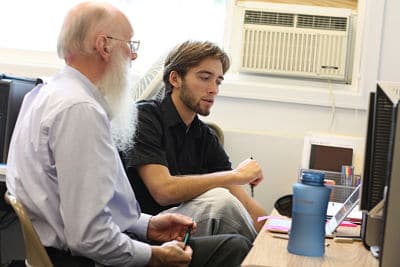Walk Beside Me
★★★★★

“Maybe God is giving you challenges this year, so you don’t get bored after all your years of teaching!” Maybe so.
Over here, we have the child who is throwing things and ramming his chair into someone. Here’s one who told me he needs something to fiddle with and he is bored. This one is clear off the charts on reading progress. That one completed his math facts program and logged in to another child’s program and was working on it. And this one—I could probably write a whole book about him! He is so distracted he rarely finishes anything on his own and has a collection of unfinished work, has melt-downs, and at times is very disrespectful, yet he has an excellent vocabulary and great interest in science.
As a teacher with 30.5 years of experience in first grade, a B.S. in Elementary Education, a M.Ed., training from workshops and other grad classes, years of experience in teaching Sunday School and Bible School, do I need a mentor?
I do! I still need someone to advise me, to come along-side and encourage and “hold up my arms.” I will admit there are times when I think I have it all together, and I’ve got this just fine, thanks anyway. There are also times when I know I need that support.
In this 31st year of teaching, I know I need that support. One of my fellow-teachers gave me the comment that I began this post with, and we laughed, as he understood that it is a challenging year, and he knows I’m definitely not bored. He is one who has given encouragement and helped me figure out things.
Mentoring has several aspects, as in this colleague listening to me and giving advice, or when another teacher says, “What if you try this?” or when my administrator comes in and backs me up in a classroom management challenge.
Mentoring may be a formal program where new or inexperienced teachers are matched with a mentor. It may be a teacher team working together, visiting each other’s classrooms and giving feedback.
In church, I recently heard an excellent sermon on mentoring, and the minister encouraged us to recognize the needs around us, seek out those in need, and be willing to be a mentor to someone. The person who is being mentored, the mentee, should be honest if they want help when asked, and not afraid to be humble.
In Exodus 18, Jethro mentors Moses. The mentor asks hard questions, then listens without condemnation to the answers. Jethro says, “What is this you are doing for the people?” He listens as Moses answers, then gives advice, as a mentor does. Moses, the mentee here, is humble as he answers Jethro and he is willing to heed Jethro’s advice.
A mentor disciples the mentee, coming alongside to help, teaching, showing the way, showing the work they must do. The mentor may ask questions—simple questions such as, “How are you doing?” which can lead to further discussion. Or he can pose questions to provoke thinking and change of practice. The mentor affirms and encourages the good she sees. The goal is for the mentee to become a disciple, then go to their place of responsibility and be a mentor.
Sometimes we need someone to call us from the good to the best with words like, “What you’re doing is okay, but not the best.” This will take humility on my part. Do I really want to grow? A mentor can help me find the best practice.
I was blessed by a mentor yesterday as she listened to me, gave encouragement, helped direct my thinking, and then said, “I want to pray for you.” She took time right then to stop and pray for me. No matter how many years of experience we have, we can become this kind of mentor!
Leave a Reply